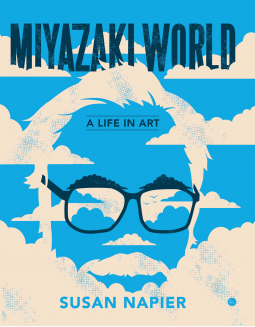Review: 'Miyazakiworld: A Life in Art' by Susan Napier
Pub. Date: 9/4/2018
Publisher: Yale University Press
The story of filmmaker Hayao Miyazaki's life and work, including his significant impact on Japan and the world
A thirtieth‑century toxic jungle, a bathhouse for tired gods, a red‑haired fish girl, and a furry woodland spirit—what do these have in common? They all spring from the mind of Hayao Miyazaki, one of the greatest living animators, known worldwide for films such as My Neighbor Totoro, Princess Mononoke, Spirited Away, Howl’s Moving Castle, and The Wind Rises.
Japanese culture and animation scholar Susan Napier explores the life and art of this extraordinary Japanese filmmaker to provide a definitive account of his oeuvre. Napier insightfully illuminates the multiple themes crisscrossing his work, from empowered women to environmental nightmares to utopian dreams, creating an unforgettable portrait of a man whose art challenged Hollywood dominance and ushered in a new chapter of global popular culture.Susan Napier is the Goldthwaite Professor of Rhetoric and Japanese Studies at Tufts University. She is the author of Anime from Akira to “Howl’s Moving Castle”: Experiencing Contemporary Japanese Animation, among other books.
Hayao Miyazaki's work has made him something of an auteur, as Susan Napier claims in Miyazakiworld, and yet this moniker hasn't always been applied. Few directors have as distinct a touch, are as immediately recognizable, and have such a vivid impact upon their audiences. Even the cover of Miyazakiworld suggests this, with its bare outline of Miyazaki's face cast into the clouds. The mention of Miyazaki or Studio Ghibli casts up a number of illusions for their fans which have won the man and the studio a place in their hearts. I found myself incredibly touched by different aspects of Miyazaki's films, specifically these "pillow scenes" where technically nothing happens but the film and the character just get to take a breath, take in a view, glory in the feeling of sun on their face, wind in their hair, or a bowl of ramen in front of them. These small beats always add an immense sense of peace and realism for me, and I try to find them in my own life as well. Similarly, the strong anti-war message of his films, combined with their animist leanings and love for the natural world, have created such resonances for viewers like myself that Miyazaki has indeed turned into an auteur director, into a one-name-recognition phenomenon, and into someone we all think we know, even though we don't. It is with this later aspect that Napier wrangles, with getting to know a man through his work or, even, despite his work.
In Miyazakiworld Napier sets out to describe the what she calls "Miyazakiworld", this vivid sense of having entered into a different world most viewers of Miyazaki's films have. I certainly feel it whenever I turn one of them on. At the hand of his films, Napier explores the life of the director and the man and shows how the two are really sides of the same coin. There is definitely an element of tracing events from his life and discovering them in his film, wondering to what extent, for example his interesting female characters come from his sickly but determined mother. I don't always enjoy this kind of analysis, as it can feel a bit cliché or overly psychoanalytical. As Napier does spend a lot of time on his relationship with his mother I occasionally found myself getting tired of the connection. But generally she does this kind of soul-searching with kindness and merely raises questions rather than cast connections in concrete. I found the first few chapters fascinating, especially Miyazaki's childhood during WWII, his guilt over his family's involvement in Japan's weapons industry, and his active involvement in the animator unions. Napier draws a portrait of a man who is deeply obsessed with his art, at the detriment of much else. She also doesn't shy away from the latter element, noting his high work-drive, his potential neglect of his family, and his high expectations. Napier's analysis of the various films she discusses are also really interesting. It can be difficult to read someone else's opinions on films you love, but in this case it gave me new insights into the works.
Susan Napier's writing is very personable and yet knowledgeable. This is a rather hard balance to strike and Napier makes it seem easy. Miyazakiworld starts with her visiting a replica of Satsuki and Mei's house from My Neighbour Totoro and you immediately feel her personal connection to these films. While she is approaching them as an academic, she is also approaching them as someone who adores these films. While this dual approach could lead to some wish-washing, they actually turn out to support each other. Her personal attention to key moments in the film and appreciation of their emotional impact allow her academic focus to sharpen into a really interesting analysis of the man and the director Hayao Miyazaki. It is also in no way an academic tome, even if it is very well-researched. Miyazakiworld is a gateway into this very world, with Napier as our guide who explains and yet also allows you to make connections for yourself.
I give this book...
4 Universes!
Miyazakiworld is a beautiful ode to Hayao Miyazaki and his work, from an author who is at once a loving fan and a critical eye. Without skirting the difficult subjects, Napier nonetheless takes a kind look at a complicated and highly inventive man. I really need a Studio Ghibli movie night now as well.





Comments
Post a Comment